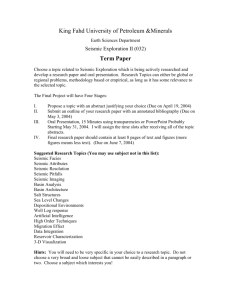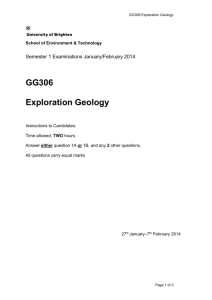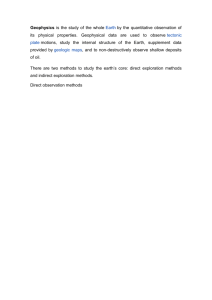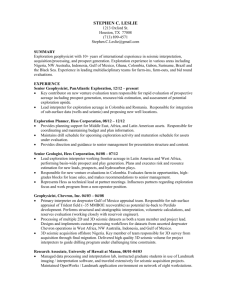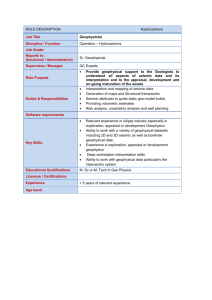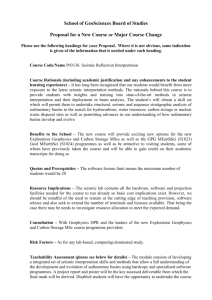Geoscience for Non-geologists with Emphasis on Petroleum
advertisement
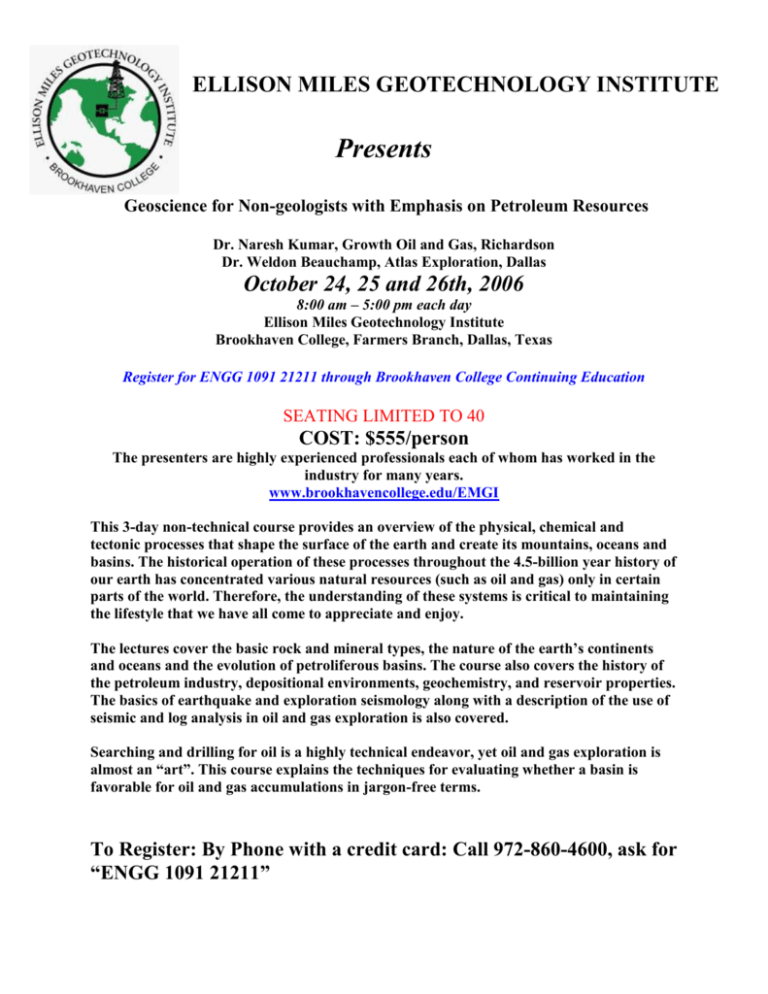
ELLISON MILES GEOTECHNOLOGY INSTITUTE PRESENTS Presents Geoscience for Non-geologists with Emphasis on Petroleum Resources Dr. Naresh Kumar, Growth Oil and Gas, Richardson Dr. Weldon Beauchamp, Atlas Exploration, Dallas October 24, 25 and 26th, 2006 8:00 am – 5:00 pm each day Ellison Miles Geotechnology Institute Brookhaven College, Farmers Branch, Dallas, Texas Register for ENGG 1091 21211 through Brookhaven College Continuing Education SEATING LIMITED TO 40 COST: $555/person The presenters are highly experienced professionals each of whom has worked in the industry for many years. www.brookhavencollege.edu/EMGI This 3-day non-technical course provides an overview of the physical, chemical and tectonic processes that shape the surface of the earth and create its mountains, oceans and basins. The historical operation of these processes throughout the 4.5-billion year history of our earth has concentrated various natural resources (such as oil and gas) only in certain parts of the world. Therefore, the understanding of these systems is critical to maintaining the lifestyle that we have all come to appreciate and enjoy. The lectures cover the basic rock and mineral types, the nature of the earth’s continents and oceans and the evolution of petroliferous basins. The course also covers the history of the petroleum industry, depositional environments, geochemistry, and reservoir properties. The basics of earthquake and exploration seismology along with a description of the use of seismic and log analysis in oil and gas exploration is also covered. Searching and drilling for oil is a highly technical endeavor, yet oil and gas exploration is almost an “art”. This course explains the techniques for evaluating whether a basin is favorable for oil and gas accumulations in jargon-free terms. To Register: By Phone with a credit card: Call 972-860-4600, ask for “ENGG 1091 21211” Short Course ENGG 1091 21211 Geoscience for Non-geologists with Emphasis on Petroleum Resources on October 24, 25 and 26, 2006 8:00 am to 5:00 pm (each day) at Ellison Miles Geotechnology Institute at Brookhaven College, Dallas by Dr. Naresh Kumar, Growth Oil and Gas, Richardson Dr. Weldon Beauchamp, Atlas Exploration, Dallas (Register for ENGG 1091 21211 through Brookhaven College Continuing Education. To register by phone with credit card: Call 972-860-4600) This 3-day non-technical course provides an overview of the physical, chemical and tectonic processes that shape the surface of the earth and create its mountains, oceans and basins. The historical operation of these processes throughout the 4.5-billion year history of our earth has concentrated various natural resources (such as oil and gas) only in certain parts of the world. Therefore, the understanding of these systems is critical to maintaining the lifestyle that we have all come to appreciate and enjoy. The course introduces the student to the theory of Plate Tectonics that allows us to explain the distributions of world’s volcanoes and earthquakes (and associated hazards), the shapes, geometries and ages of various continents and oceans as well as the evolution of the mountains and basins they contain. Plate Tectonics also forms the basis for understanding the distribution of most natural resources, especially the hydrocarbons (oil and gas). Within the framework of this theory we can explain petroleum generation, migration, and trapping and why certain of the world’s geologic basins are so prolific in oil and gas resources. The lectures cover the basic rock and mineral types, the nature of the earth’s continents and oceans and the evolution of petroliferous basins. The course also covers the history of the petroleum industry, depositional environments, geochemistry, and reservoir properties. The basics of earthquake and exploration seismology along with a description of the use of seismic and log analysis in oil and gas exploration is covered. Searching and drilling for oil is a highly technical endeavor, yet oil and gas exploration is almost an “art”. This course explains the techniques for evaluating whether a basin is favorable for oil and gas accumulations in jargon-free terms. DURATION 3 days (lecture/workshop format) COST $555.00 (includes all materials and lunches) MAXIMUM ENROLMENT (Per session): 40 WHO SHOULD ATTEND Technical and business professionals (such as landmen, title analysts, administrators, executive assistants, and finance and planning professionals) working in the oil and gas industry who would like the basics of the “science” of geology and the oil business. Land and royalty owners, as well as recent geology and geophysics graduates who would like an overview of the petroleum industry would also benefit from the course. Course Outline: Day 1 (Morning): Dr. Kumar Introduction: Earth as a Dynamic System Overview, earth’s structure and its systems, basic rock and mineral types, evolution of the concepts of Plate Tectonics, geologic time scale and the distribution of natural resources within the Plate-tectonic framework. Day 1 (Afternoon): Dr. Kumar Petroleum Systems: Their formation and distribution in time and space Basics of Stratigraphy, sedimentology and depositional environments, oil and gas generation, migration and trapping,. concept of “source rock”, oil and gas “kitchen”. Basics of mapping structural and stratigraphic trap geometries and use of logs. Day 2 (Morning): Dr. Beauchamp Basics of Structural Geology and Stratigraphy Review of basic principles of structural deformation (compression and extension). Introduction of basic stratigraphic and sedimentological principles. Applied examples of structural and stratigraphic styles interpreted from seismic reflection data. Day 2 (Afternoon): Dr. Beauchamp Fundamentals of Geophysics: Principles of Physics applied to the study of earth Fundamentals of earthquake and exploration seismology, acquisition, processing, and interpretation of seismic data. Advantages and costs of 2D versus 3 D seismic data. Day 3 (Morning): Dr. Beauchamp Applied Seismic Interpretation and seismic attributes (DHIs and AVO). Applied seismic interpretation (case studies). Direct Hydrocarbon Indicators, Amplitudeversus-Offset, seismic attributes and other modern interpretation techniques. Day 3 (Afternoon): Dr. Kumar Resource, Risk and Reserve Analysis, Future of Oil and Gas Estimated volumes of known and potential oil and gas resources of the world as well as the United States. Are we running out of oil? Basic business principles applied in the oil and gas industry and the future of oil and gas as our primary energy source. Instructors: Dr. Naresh Kumar, Growth Oil and Gas, Richardson Naresh Kumar is a Dallas-based consultant and instructor. Naresh worked for ARCO for almost twenty years and headed their worldwide oil and gas exploration research. Since retiring from his position as an ARCO executive, he has consulted for clients worldwide. He has taught at Columbia University, Fairleigh Dickinson University, UTDallas and at Richland and Brookhaven Colleges. Naresh has published more than sixty papers and abstracts on oil and gas exploration. Dr. Weldon Beauchamp, Atlas Exploration, Dallas Weldon owns Atlas exploration in Dallas. He is a consultant, prospect generator, and participant in oil and gas projects. He has worked for several companies, including ARCO as a geophysicist. He is also an Adjunct Professor at the University of Texas Dallas and has taught short courses at Brookhaven College. He has published papers on geophysics in several international journals
